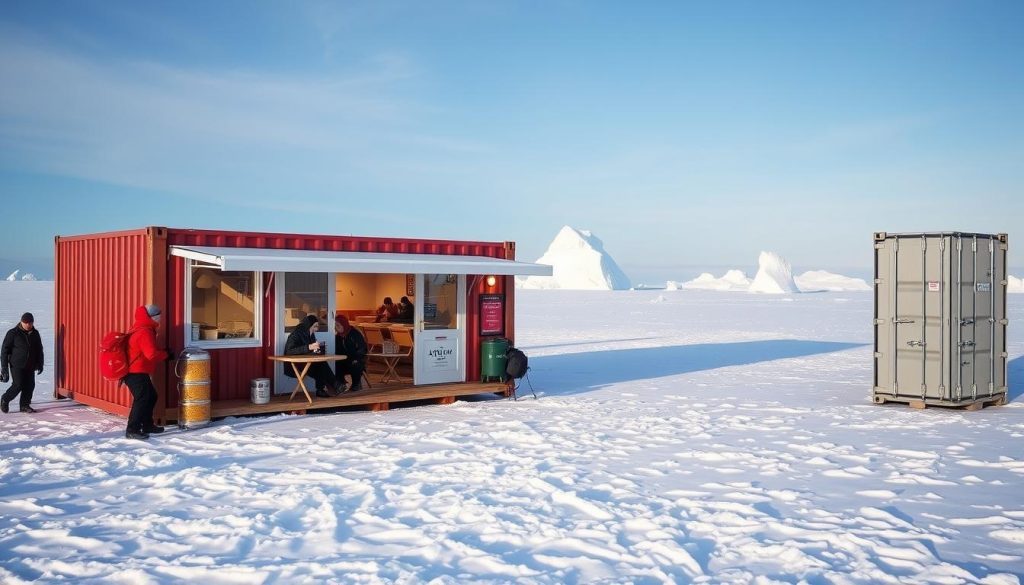Starting a small business in Antarctica offers unique challenges and opportunities. The harsh, remote landscape holds potential for innovation. Researchers can advance science and create viable businesses. Focus areas include eco-tourism, remote operations, and scientific consulting. With the right skills, one can find lucrative opportunities in Antarctica. These contribute to personal and communal growth.
The Unique Environment of Antarctica

Antarctica stands out with its stunning beauty and tough challenges. Those wanting to start a business there need to understand its extreme weather. The freezing cold, ice, and strong winds affect how businesses operate every day.
Getting to Antarctica is harder at certain times of the year. This affects when businesses can work. Most research bases are only reachable during some seasons. So, knowing these time frames is key for successful planning.
The harsh weather in Antarctica requires entrepreneurs to be strong and flexible. Being ready for sudden changes in weather and plans is vital. The unique qualities of Antarctica bring both great prospects and hurdles for adventurers.
Identifying Varied Opportunities for Entrepreneurs

Antarctica is a special place for entrepreneurs, especially those looking at research. Niche markets in this cold environment offer unique chances for business growth. It invites both freelancers and companies to meet specific needs.
Innovation in research is key, especially with equipment for extreme conditions. Entrepreneurs can make high-quality gear. This includes everything from tough fieldwork supplies to high-tech gadgets.
Another opportunity lies in offering consultancy services in Antarctica. Experts in fields like environmental science to logistics can provide valuable advice. They help tackle the special challenges researchers face in distant places.
- Creation of educational programmes, fostering skill development for researchers.
- Supply of sustainable products, emphasising environmentally friendly practices.
- Logistical support services, ensuring seamless operations for various research projects.
Being eco-friendly is becoming more important in business. Entrepreneurs can make their businesses sustainable. This helps the Antarctic environment and supports research efforts.
Understanding the Legal Landscape

Starting a small business in Antarctica means you need to know the legal rules well. The Antarctic Treaty System sets strict legal demands to protect the environment and keep businesses in line. It’s crucial for entrepreneurs to get the right permits to work legally.
Permits and Regulations for Small Businesses
For a small business in the Antarctic, there are many rules to follow. Here are key points about the legal requirements:
- Obtain small business permits that match the Antarctic Treaty’s rules.
- Do full environmental checks before starting your business.
- Follow the rules made by the authorities.
- Keep up with paperwork and reports as the law asks.
Research Station Collaborations
Working with research stations can make your business stronger. This partnership means you get to share resources and ideas. Consider these points for a good collaboration:
- Look for research stations with goals that match yours.
- Seek out joint project or funding opportunities.
- Use shared facilities to cut down on costs.
- Create networks for access to more researchers and experts.
Starting a Small Business in Antarctica as a Researcher
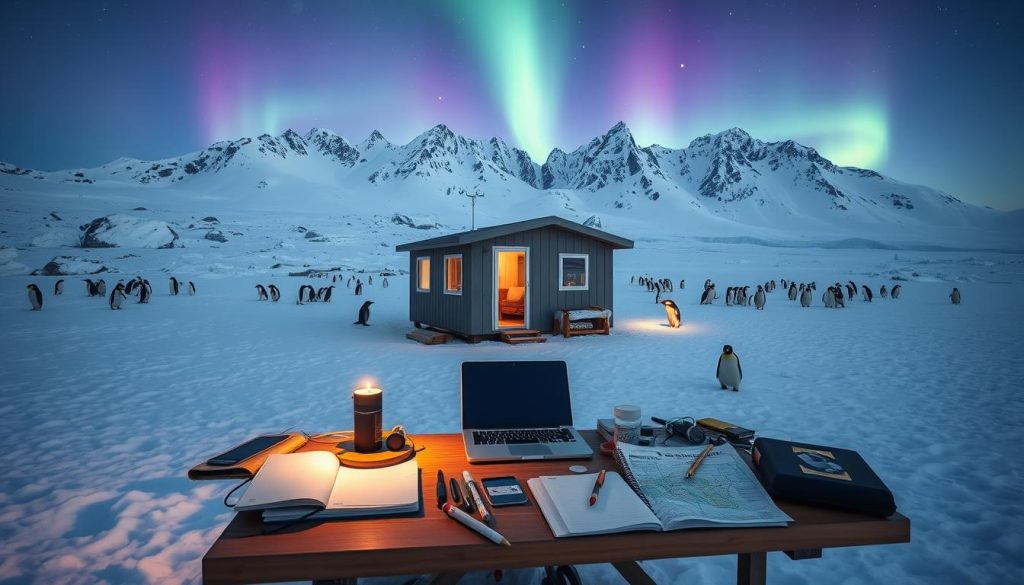
Starting a business in Antarctica is both challenging and rewarding. A detailed startup guide is crucial for the enterprising researcher. This guide needs to cover the steps from the idea stage to execution. It also must consider Antarctica’s unique features and how they impact your business.
First, detailed market research is key. It helps you find unmet needs and opportunities. Coupling your business goals with your scientific aims can lead to success. Think about products or services that help your research and the environment.
After finding a good business idea, you should focus on making a comprehensive plan. This plan needs to look at logistics, supply chains, and how to operate in Antarctica. Crafting a clear business model is essential, especially with the challenges of such a remote area.
To sum up, succeeding in Antarctica as an entrepreneur takes careful planning and understanding. By using your expertise and resources well, you can build a business that flourishes and positively affects Antarctica.
The Logistics of Operating in a Remote Area
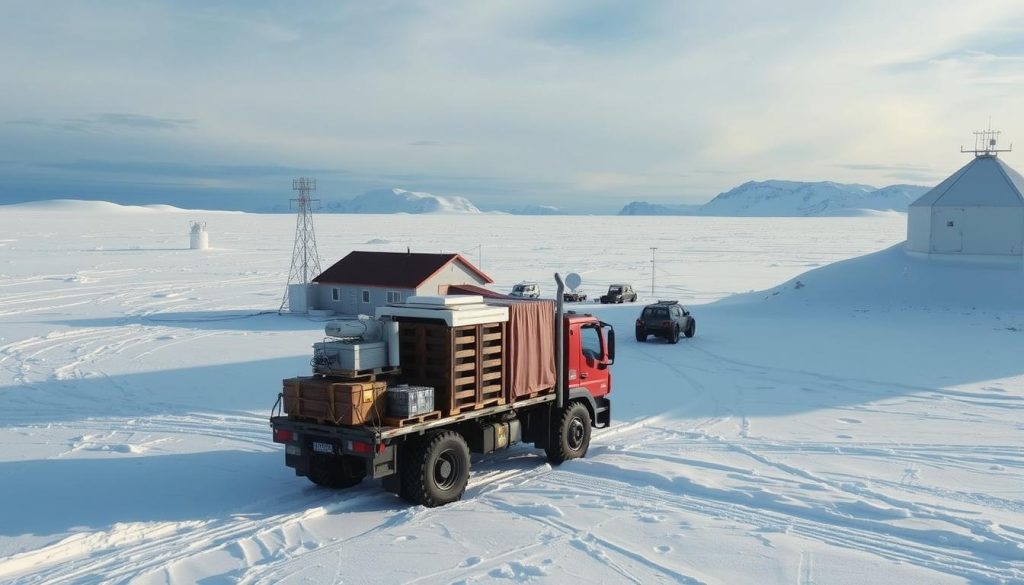
Running a business in Antarctica is full of big challenges. The need for careful planning is key to make it work. Knowing how to handle the supply chain there is vital for those wanting to start a sustainable business in such an isolated spot.
Supply Chain Considerations
The supply chain in Antarctica is unlike anywhere else because it’s so remote and hard to reach. Researchers have to plan for longer times to get supplies and essentials. To tackle these issues, thinking about a few important points helps:
- Pre-planning procurement schedules to account for delays.
- Collaborating with suppliers who have experience with Antarctic operations.
- Utilising technology for real-time tracking of shipments.
Transport Challenges
Getting goods around in Antarctica is key to any business’s success there. With air, sea, and land options, each has its own problems to consider. The weather can often mess up plans, making things even more difficult. To deal with transport issues, researchers should:
- Robust planning for adverse weather scenarios.
- Implementing alternative delivery solutions to ensure consistent operations.
- Establishing reliable partnerships with transport providers familiar with Antarctic logistics.
Funding Your Antarctic Business Venture
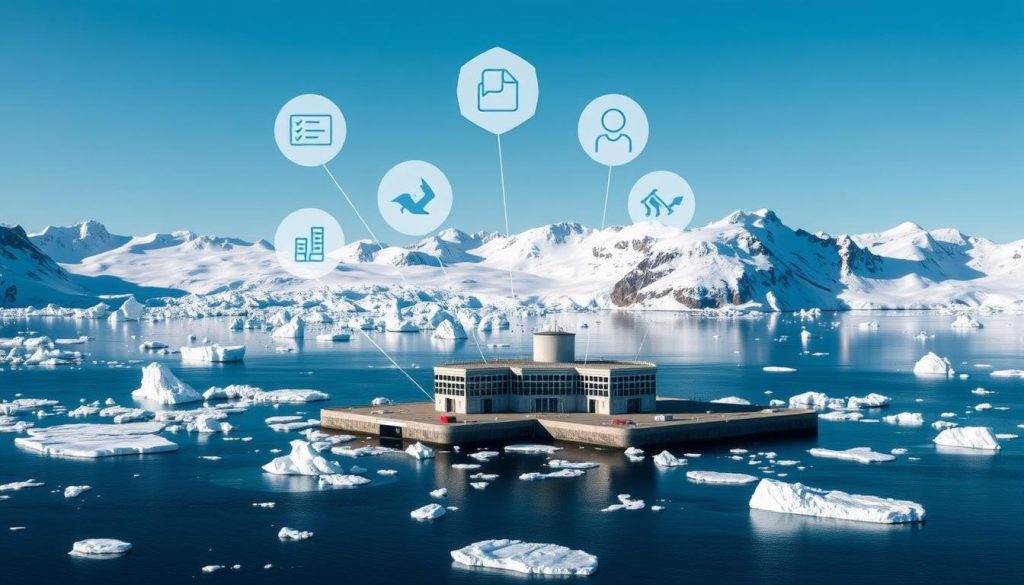
Starting a business in Antarctica has unique financing challenges. There are many funding options for entrepreneurs. One main option is government grants for research.
These grants focus on enhancing scientific knowledge of Antarctica. They support projects that offer innovative solutions.
Venture financing is another option for those with innovative ideas. Investors seek ventures that offer potential profits and societal benefits. Entrepreneurs should prepare detailed pitches to showcase their business goals.
Their pitches should also explain the business’s impact on research and the environment.
Crowdfunding is a popular method for funding Antarctic projects. It lets entrepreneurs share their ideas with the public. They can attract support from people interested in science and innovation.
It’s important to clearly communicate the venture’s goals and benefits. This helps in getting backers for the project.
When seeking funds, preparing a strong grant application is crucial. A proposal must cover the research aims and methods. It should also predict the expected outcomes.
Showing the project’s scientific value and relevance to Antarctica helps. This makes a strong case for funding.
Entrepreneurs must work hard on their applications and presentations. This dedication is key to securing venture financing. With effort, they can form successful partnerships and launch successful Antarctic businesses.
Essential Skills for Antarctic Entrepreneurs
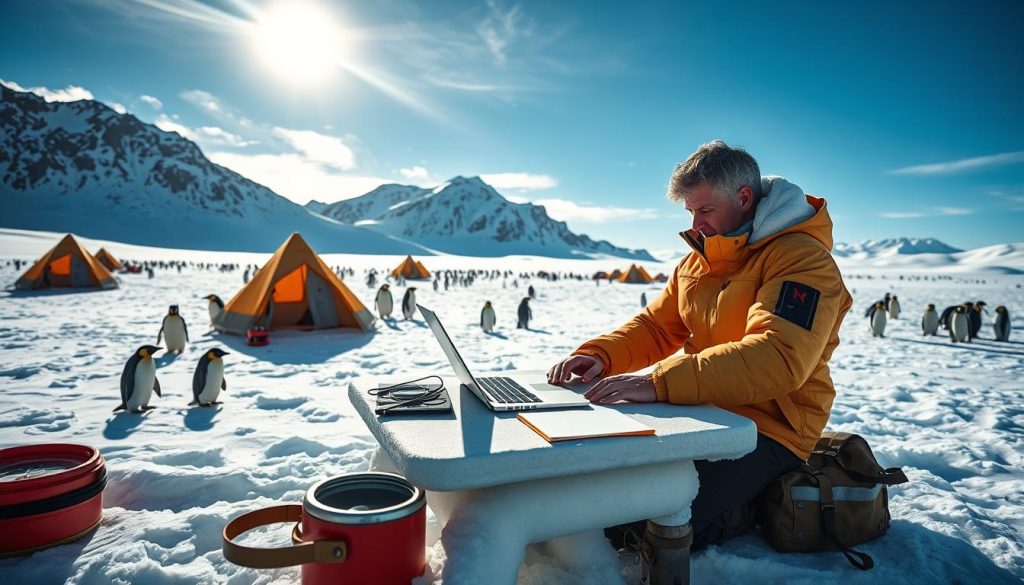
Being successful in Antarctica’s unique setting requires special skills. Key among these is the ability to research and analyse data. This helps entrepreneurs understand market needs and make choices based on solid information. They can tackle the unique challenges of this isolated area more effectively.
Research and Data Analysis Skills
Entrepreneurs need to be good at collecting and making sense of data to plan their business moves. They must be skilled in:
- Spotting important trends and needs in the science world.
- Doing market research to know their potential customers better.
- Making choices based on data to improve their business.
Marketing and Networking in Isolated Conditions
In Antarctica, marketing needs creativity and the ability to adjust. Entrepreneurs must use different platforms to spread the word about their work. Important tactics include:
- Using social media for outreach and building brand awareness.
- Connecting with professional networks to form strong bonds.
- Designing marketing efforts that speak to both local and distant audiences.
Building networks is crucial to create partnerships despite the distance. This helps entrepreneurs in Antarctica grow and share resources.
Collaborating with Existing Research Institutions

Working with established research institutions offers big chances for Antarctica’s entrepreneurs. This teamwork brings academic ties that lead to new ideas and helps both sides. By partnering with respected schools, companies gain key resources and know-how needed to thrive.
Forming alliances with research bodies means sharing knowledge and tools. This sets the stage for big discoveries. These partnerships also bring in more money, boosting both research and business plans. Working together helps entrepreneurs build trust and a good name, which is vital in a tough market.
- Exchange of resources and expertise can lead to shared successes.
- Collaborative projects can improve chances of receiving grants and funding.
- Networking within academic circles can create valuable connections and support.
In sum, partnering for research highlights why it’s key for entrepreneurs in Antarctica. Making academic friends with smart plans will surely boost chances for lasting success.
Marketing Your Business in a Niche Market

To market successfully in Antarctica, you need a plan that pinpoints your ideal customers. Careful market research will show what researchers and educational institutions want and need. By understanding this unique market, businesses can craft strategies that meet the special needs of their customers.
Target Audience Identification
Finding your target audience is key for creating the right offers and messages. Important steps include:
- Conducting surveys and interviews with researchers to learn about their requirements.
- Looking at data from businesses that already serve the research community.
- Breaking down potential customers to provide personalised products and services.
Utilising Online Platforms for Exposure
Having a strong online presence helps you reach your audience well. You can use different online channels, like:
- Building a website that highlights what you offer.
- Engaging with the research community on social media.
- Joining in on forums and talks that match your niche.
Using SEO and creating great content can make you more visible to those interested in Antarctic research. The right online methods help businesses connect with and keep their target audience.
Leveraging Technology for Business Operations
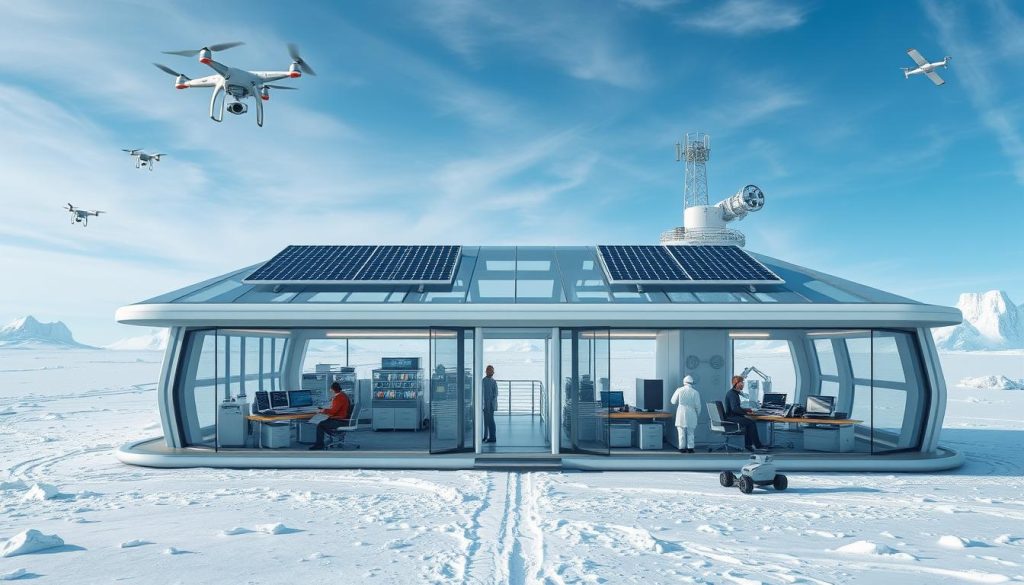
In the tough setting of Antarctica, using technology in business is key for success. Digital tools help make work smoother, improve how we talk, and let us deeply analyze data. With these tech solutions, business owners can set up effective operations essential in remote areas.
Automation is a big plus, making routine jobs run with less human help. This method cuts down costs and makes operations more reliable. Cloud services let teams work together in real time, so researchers can share updates and findings from anywhere.
Also, using project management software like Trello or Asana can make work flow better. These tools help keep track of what needs to be done, by when, and who is responsible. This way, teams become more accountable and organised, which is vital in tough environments.
Taking advantage of technology in Antarctica’s business operations opens doors for better productivity. It lets business leaders focus on being innovative and flexible, which is very important in the fast-changing research world of this unique place.
Safety and Sustainability Considerations
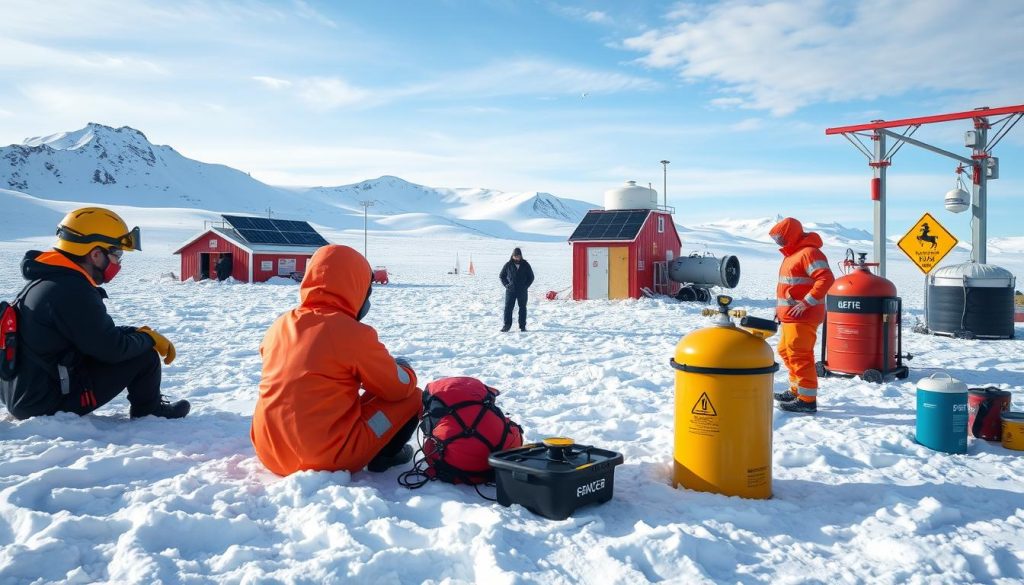
In Antarctica’s harsh yet fragile environment, focusing on safety and environmental sustainability is crucial for businesses. It’s vital to have strong safety protocols. They ensure the well-being of staff and the operation’s integrity. Committing to environmental sustainability protects this unique ecosystem, too.
Environmental Best Practices
To succeed in Antarctica, businesses must carefully plan and follow guidelines. Key practices are:
- Regularly training staff in safety protocols to handle emergencies and equipment safely.
- Minimising waste by incorporating recycling and waste management strategies.
- Utilising renewable energy sources whenever possible to reduce the carbon footprint.
- Conducting environmental impact assessments before launching new projects.
- Ensuring all materials used in operations are sustainable and non-harmful to the environment.
Businesses in Antarctica focus on these steps to help preserve its landscapes. Doing so makes sure safety is a top priority. This balance between safety and sustainability boosts a venture’s reputation. It also shows commitment to responsible and ethical business actions worldwide.
The Impact of Climate Change on Business Opportunities
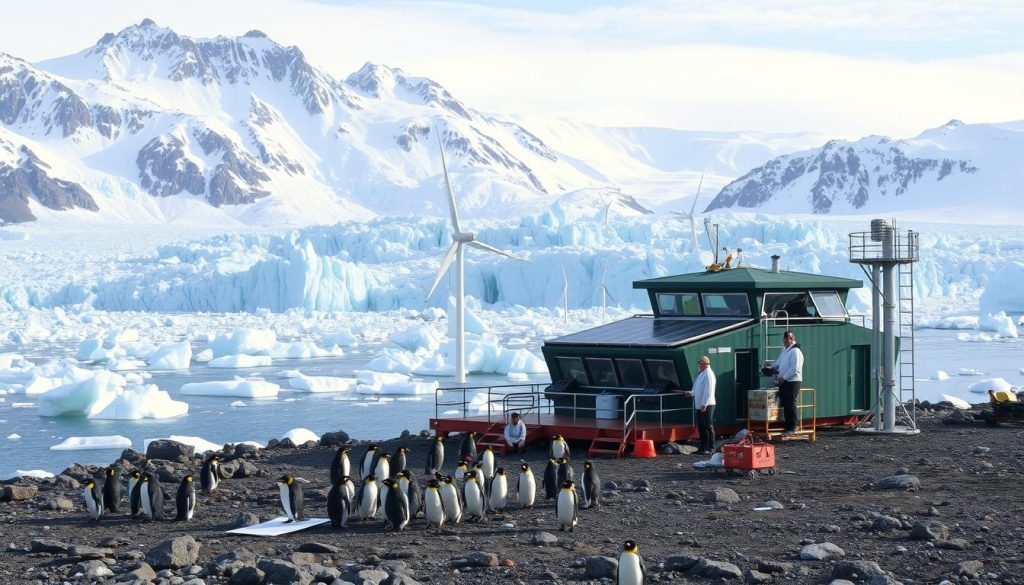
Climate change is reshaping Antarctica, creating new business chances. As glaciers melt and weather changes, entrepreneurs find fresh ideas. They see these shifts as a way to evolve and meet new needs in this changing place.
Thawing ground and different wildlife patterns need new solutions. This creates opportunities, especially in research and development. Companies focusing on the environment, sustainable ways, and staying strong against climate change can do well.
Adjusting businesses to fit climate change is key to thriving. Entrepreneurs ready to change and innovate will find success. This challenging situation offers a chance to grow and make a difference.
Creating a Supportive Community of Researchers
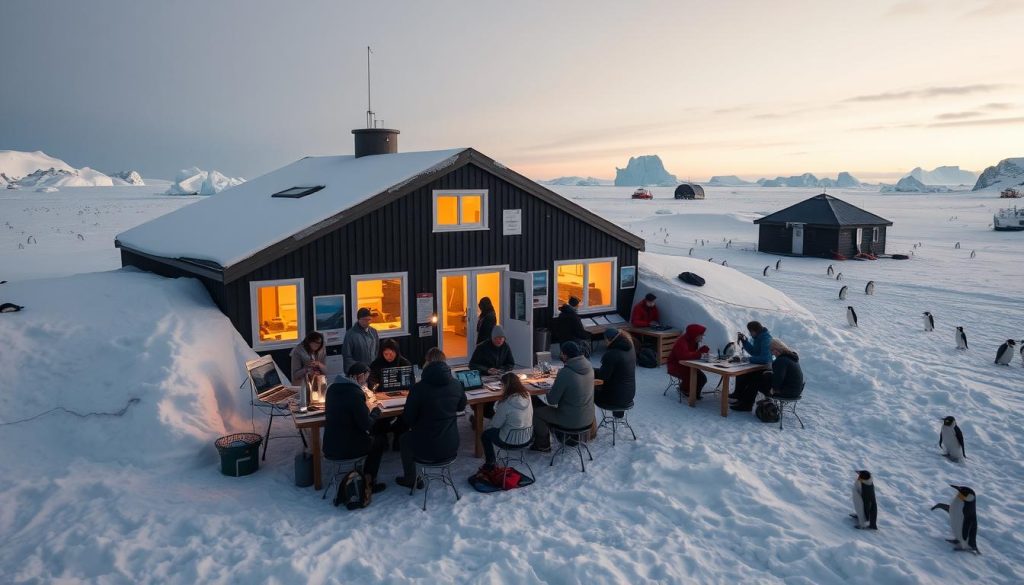
Creating a vibrant community of researchers in Antarctica is key to driving innovation. By connecting with like-minded folks, researchers share and grow together. This network sparks new ideas and partnerships.
Being part of this community enriches one’s knowledge and opens doors for collaboration. Such connections are vital for making groundbreaking discoveries together.
Networking Events and Workshops
Networking events and workshops are vital for researchers. They allow sharing of ideas and fostering of new partnerships. These events are platforms for:
- Sharing best practices and research findings.
- Identifying market gaps for new ventures.
- Establishing mentorships to guide newcomers.
Connections made at these events often spark new projects and methods. By working together, researchers overcome Antarctica’s challenges more effectively. These interactions are essential for a thriving research community.
Potential Challenges and Solutions
Starting a business in Antarctica comes with unique challenges due to its harsh environment and isolation. Entrepreneurs face logistical problems that can delay projects and push up costs. They have to deal with limited transport options and broken supply chains. This requires creative solutions and effective backup plans for unexpected events. These plans help businesses quickly adjust and keep running smoothly.
Finding funding is another big hurdle in Antarctica’s tough business environment. Standard ways of getting money might not work, leading to the need for new approaches. Entrepreneurs can partner with research bodies or get special grants focused on protecting the environment and science. Working with others eases the financial load and builds a network for support to face any challenge.
Environmental rules add extra challenges for businesses in Antarctica. Entrepreneurs have to be eco-friendly and follow strict laws, all while being mindful of climate change. They should be ready to change their operations based on advice from scientists and environmental reports. This openness to change and innovation lets them see challenges as chances to succeed in one of the toughest places for business.

